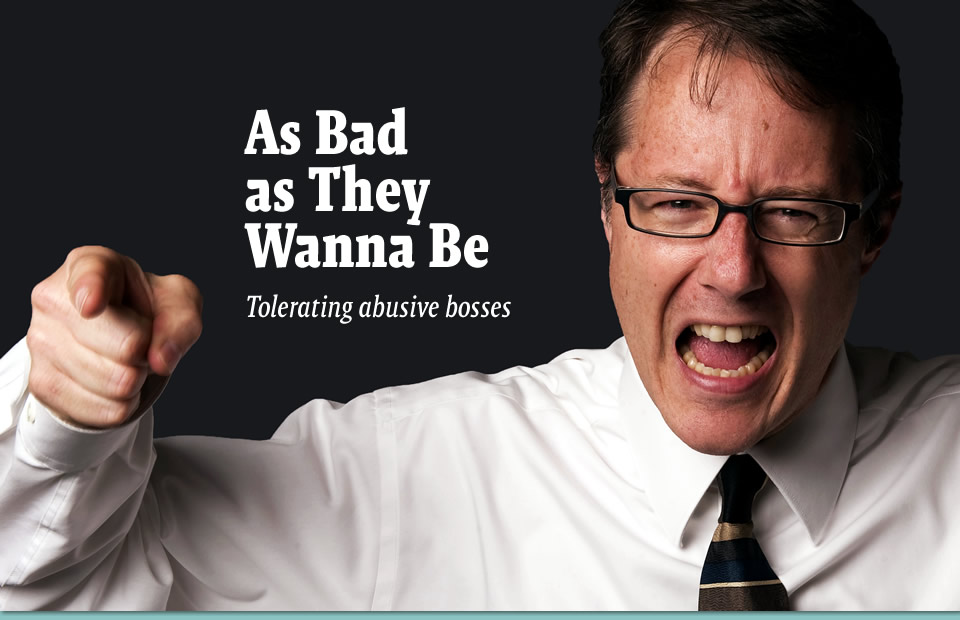-
Page Navigation Links:
- Skip to Site Navigation Links
- Skip to Features

- The University of Iowa
- Spectator
- Monthly News for UI Alumni and Friends
Nearly everyone has had a bad boss, if not now, then at some point in their lives—the ranter, the screamer, the wanna-be Marine drill sergeant who thinks the best motivational tool is to humiliate employees in front of their peers.
They treat people like dirt, yet it seems that companies tolerate their behavior. Why? Two University of Iowa doctoral students are trying to find out.
A recent study by Jonathan Shaffer and Stephen Courtright, doctoral students in the Tippie College of Business, and Amy Colbert, a Tippie assistant professor of management and organizations, lends credence to the idea that as long as managers produce, they can be about as abusive as they want toward the people who report to them.
How did your study reach these conclusions?
Shaffer: We looked at how third parties react to examples of abusive behavior by management. Many studies have looked at how the target of an abusive supervisor reacts, but we wanted to learn how others—coworkers, other managers, stockholders—respond to the behavior. No other scholarly work has examined that aspect before.
We found that third parties tend to accept the abuse if the supervisor is seen as productive and effective and the witnesses don’t feel like they’ll be the next targets. In contrast, abuse plays a predominant role when parties judge the personal appeal of the same high-performing abusive supervisor.
Are there any high profile examples of an abusive supervisor whose behavior is tolerated?
Courtright: In our research, we found Steve Jobs, the CEO of Apple, is a good case in point. Jobs is nearly universally praised for his leadership of Apple and for fostering a culture of innovation that few companies can match while making lots of money for lots of people. Yet, Jobs is also regarded as one of Corporate America’s biggest tyrants, known for throwing temper tantrums and dressing down employees in humiliating fashion. But he’s clearly productive, and as long as Apple stays on the cutting edge and keeps making a profit, people will tolerate his behavior.
This doesn’t mean that people necessarily like those supervisors as people, though.
Shaffer: That’s right. The research found that even high performing abusive supervisors are held in low esteem from a personal perspective. People are willing to put up with an abusive supervisor who’s productive, but they don’t necessarily want to be friends with them.
Our study also suggests that people who are more empathetic are less likely to overlook the negative behavior than less empathetic people. We found that a more empathetic person is less likely to evaluate an abusive boss as effective, regardless of the boss’ productivity.
So as long as the supervisor is productive, does it make sense for the company to tolerate it?
Courtright: Probably not. In the long run, it could become counterproductive. Previous research has found that abusive supervisors lower morale among employees, increase absenteeism, and reduce productivity. Eventually, that will damage a company’s bottom line, so organizations that do not specifically have a system in place to assess a supervisor’s behavior may be allowing behavior that leads to lower productivity in the long term.
That’s why it’s important for organizations to take steps to ensure that abusive supervisors are not rated as effective, thus reinforcing abusive behavior. To do so, they may need to design performance evaluations that specifically take into account both the outcomes achieved by supervisors and the way in which employees are treated in the process of achieving those outcomes.
—Tom Snee
with photo by Kirk Murray
The Shaffer, Courtright, and Colbert study, “Perpetuating Abusive Supervision: Third Party Reactions to Abuse in the Workplace,” was presented in 2009 at a conference of the Society for Industrial and Organizational Psychology. Todd Darnold, an assistant professor at Creighton University, also participated in the study.
© The University of Iowa 2009
